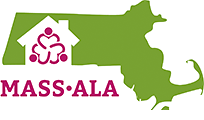Other Senior Living Options
Senior Living Options in Massachusetts
There are a variety of settings for seniors in Massachusetts. Below, you will find a description of some of the most common types of care options.
|
Each housing & care option below is very different and offers different things based on the needs of the prospective resident. It’s important to look into each one and know your options. While we primarily deal with assisted living, we can assist you with contacting a different housing option if you are unsure the next step.
|
The Adult Family Care (Adult Foster Care-AFC) Program
places adults who are not able to live alone safely in the homes of host families willing to care for them. The program is for adults who need daily help with personal care, but want to live in a family setting rather than in a nursing home or other facility.
The host caregiver provides a private bedroom, meals, companionship, personal care assistance, and 24-hour supervision. For a list contact your Aging Service Access Point at www.800ageinfo.com.
Assisted Living Residences
are a special combination of housing and personalized services designed to meet the needs, both scheduled and unscheduled, of those who require help with activities of daily living. Activities of daily living include tasks related to bathing, dressing, grooming, eating and other similar personal care needs. Some assisted living residences have special units for seniors with specific conditions such as Alzheimer’s disease. Assisted living residences are certified by the Executive Office of Elder Affairs.
Congregate Housing
is a shared living environment designed to integrate the housing and services needs of seniors and younger disabled individuals. The goal of Congregate Housing is to increase self-sufficiency through the provision of supportive services in a residential setting. Congregate Housing is neither a nursing home nor a medical care facility. Download a list of congregate housing options.
Continuing Care Retirement Communities (CCRCs)
usually comprised of independent living, personal services and skilled nursing care, at one location. As a person’s personal and health care needs change, they are able to remain at the retirement community. CCRCs may, but are not required to obtain assisted living certification. Search CCRCs in the state.
Housing with Services
re apartments that have additional services available to residents such as central dining, laundry, homemaking, personal care, activities and wellness programs. For a list go to www.800ageinfo.com.
Independant Living
are units in assisted living residences, CCRCs, public housing and other apartment settings that may include some basic services such as meals, housekeeping and access to transportation.
Nursing Homes
also referred to as skilled nursing facilities, can be both long-term and short-term care facilities. They provide shelter, meals, social activities, assistance with activities of daily living and 24 hour skilled nursing care. Long-term care and services are for those who cannot take care of themselves and can no longer live independently because of physical, emotional, or mental problems. Short-term nursing care can be provided for those who need nursing care and rehabilitation. Some nursing homes have special wings for seniors with specific conditions such as Alzheimer’s disease. All nursing homes are licensed by the Department of Public Health. For a list go to www.masslongtermcare.org.
Public Housing
is low-rent housing built with government money. In cities throughout Massachusetts, the federal and state governments provide money for public housing for low and moderate-income families, the elderly, and people with disabilities. Local housing authorities run the public housing programs in Massachusetts. Learn more about housing authorities.
Residential Care Homes
provide housing, support services, and medical oversight in a residential setting. These homes are capable of administering medications, scheduling medical appointments, serving three meals daily, 24-hour staff to respond to residents who are more capable of living on their own, but do need assistance in certain areas. They are licensed by the Massachusetts Department of Public Health as long-term care facilities. For a list go to Leading Age or MassLongTermCare.
The Supportive Housing Initiative
was developed by the Executive Office of Elder Affairs (Elder Affairs) and the Department of Housing and Community Development (DHCD) to create an “assisted living like” environment in state funded public elderly/disabled housing. Download a list of suportive housing options.
